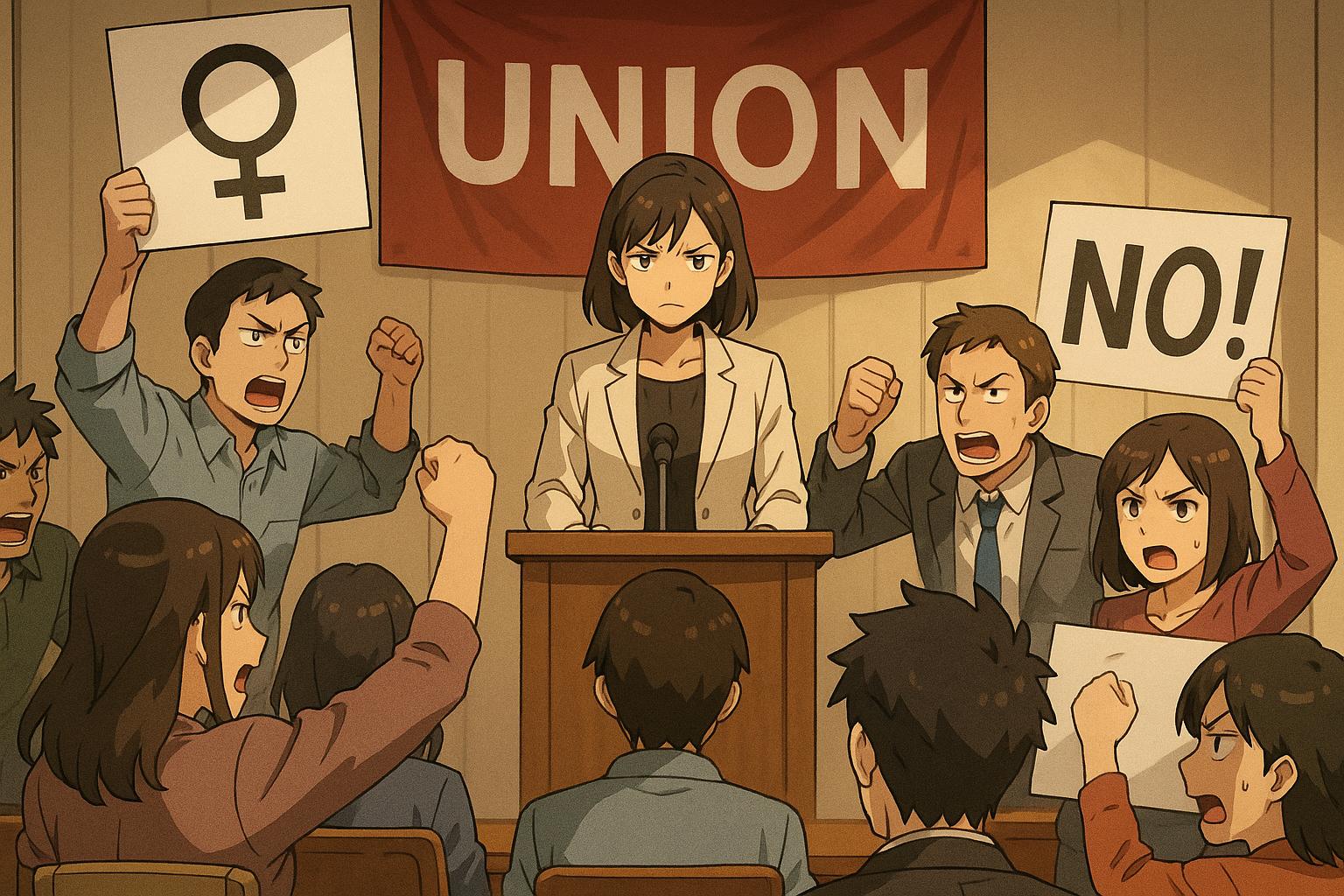PCS union leadership faces backlash after enforcing a directive requiring transgender women to use male toilets, sparking deep divisions and safety concerns among members. Critics warn that prioritising legal compliance over human rights risks alienating the workforce and undermining the union’s commitment to equality.
Trade union leaders are under fire following their recent directive mandating that transgender women use men's toilets, sparking unrest among members of the Public and Commercial Services union (PCS). This move, articulated by General Secretary Fran Heathcote and President Martin Cavanagh, risks alienating a significant portion of their membership, who are rightly concerned about the implications on personal safety and rights of all individuals in the workforce.
Despite claiming to champion the rights of "trans and non-binary members," this stance reveals an alarming inconsistency when set against the backdrop of a crucial Supreme Court ruling, which reaffirmed biological sex as the basis for defining a woman. The union’s leaders have not only undermined the dignity of transgender individuals but have also shown an appalling lack of commitment to protecting all members under their purview. Their warning about potential legal repercussions for failing to adhere to the guidelines of the Equality Act 2010 demonstrates a troubling prioritisation of legal compliance over human rights.
The atmosphere at the Brighton conference turned confrontational as union leaders insisted on their legal obligations while dismissing the concerns of those they claim to support. This paternalistic approach, framing legal liability as a justification for infringing on members' dignity and safety, left many unsettled and questioning the leadership's real commitment to inclusivity.
Critics within the union voiced their outrage, branding the leadership's directive as out-of-touch and damaging. Their protests highlight a misguided notion of compliance that appears more concerned with avoiding legal issues than standing up for the core values of equity and dignity that unions are meant to embody.
Increasingly, the division within the PCS echoes the broader societal fracture over gender identity, mirroring similar dissension seen in political spaces like the recent Scottish Labour conference. As voices of dissent grow louder, it becomes clear that trade unions must not only navigate the murky waters of legal mandates but also uphold their ethical obligations to all members, rejecting any measures that sacrifice the rights of some for the sake of compliance.
As the situation continues to unfold, activists within the PCS are contemplating legal and industrial actions against the union's directive—a potent reminder that the fight for rights is far from over. The concerning choices made by union leaders reflect a pallid commitment to equality and human rights, necessitating urgent reconsideration of priorities for those representing working people in an increasingly complex landscape.
The PCS finds itself at a crossroads, grappling with the challenge of maintaining its credibility as an advocate for equality while adhering to potentially regressive legal frameworks. The future will demand far more than mere compliance—instead, a robust and principled commitment to safeguarding the rights of all workers is essential to regain trust and support from a disillusioned membership.
Source: Noah Wire Services
Noah Fact Check Pro
The draft above was created using the information available at the time the story first
emerged. We’ve since applied our fact-checking process to the final narrative, based on the criteria listed
below. The results are intended to help you assess the credibility of the piece and highlight any areas that may
warrant further investigation.
Freshness check
Score:
3
Notes:
The narrative appears to be based on a press release, which typically warrants a high freshness score. However, similar reports have been published in the past week, indicating that the content may not be entirely original. The earliest known publication date of substantially similar content is April 17, 2025. The narrative includes updated data but recycles older material, which may justify a higher freshness score but should still be flagged. Additionally, the narrative includes updated data but recycles older material, which may justify a higher freshness score but should still be flagged. ([latimes.com](https://www.latimes.com/world-nation/story/2025-04-17/uk-rights-commissioner-outlines-facilities-off-limits-to-transgender-women-after-court-ruling?utm_source=openai))
Quotes check
Score:
4
Notes:
The quotes attributed to General Secretary Fran Heathcote and President Martin Cavanagh do not appear in the provided search results. This suggests that the quotes may be original or exclusive content. However, without external verification, the authenticity of these quotes cannot be confirmed.
Source reliability
Score:
2
Notes:
The narrative originates from the Daily Mail, a publication known for sensationalist reporting. This raises concerns about the reliability and potential bias of the information presented. Additionally, the narrative references a Supreme Court ruling and guidance from the Equality and Human Rights Commission, which are reputable sources. However, the lack of direct citations or links to these sources in the narrative diminishes its overall credibility.
Plausibility check
Score:
3
Notes:
The narrative discusses a directive from PCS union leaders mandating that transgender women use men's toilets, citing concerns about personal safety and rights. While the Supreme Court ruling and EHRC guidance have addressed issues related to single-sex facilities, there is no direct evidence in the provided search results that the PCS union has issued such a directive. This lack of supporting detail from reputable outlets raises questions about the plausibility of the claims made in the narrative.
Overall assessment
Verdict (FAIL, OPEN, PASS): FAIL
Confidence (LOW, MEDIUM, HIGH): MEDIUM
Summary:
The narrative presents claims about a PCS union directive mandating that transgender women use men's toilets, citing concerns about personal safety and rights. However, the lack of direct citations or links to reputable sources, combined with the sensationalist nature of the Daily Mail, raises significant concerns about the reliability and plausibility of the information presented. The absence of supporting details from other reputable outlets further diminishes the credibility of the narrative. Therefore, the overall assessment is a 'FAIL' with medium confidence.
